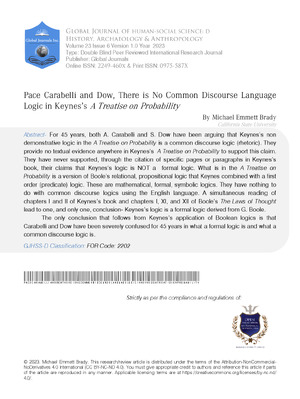Pace Carabelli and Dow, There is No Common Discourse Language Logic in Keynes’s A Treatise on Probability
Abstract
For 45 years both A Carabelli and S Dow have been arguing that Keynes s non demonstrative logic in the A Treatise on Probability is a common discourse logic rhetoric They provide no textual evidence anywhere in Keynes s A Treatise on Probability to support this claim They have never supported through the citation of specific pages or paragraphs in Keynes s book their claims that Keynes s logic is NOT a formal logic What is in the A Treatise on Probability is a version of Boole s relational propositional logic that Keynes combined with a first order predicate logic These are mathematical formal symbolic logics They have nothing to do with common discourse logics using the English language A simultaneous reading of chapters I and II of Keynes s book and chapters I XI and XII of Boole s The Laws of Thought lead to one and only one conclusion- Keynes s logic is a formal logic derived from G Boole The only conclusion that follows from Keynes s application of Boolean logics is that Carabelli and Dow have been severely confused for 45 years in what a formal logic is and what a common discourse logic is Given that Keynes s non-demonstrative logic is a formal mathematical symbolic logic the only conclusion possible is that Keynes is a formalist and a logicist who was and is vastly superior to any economist either orthodox or heterodox in the 20th and 21st centuries
Downloads
How to Cite
References

Published
2024-01-19
Issue
Section
License
Copyright (c) 2023 Authors and Global Journals Private Limited

This work is licensed under a Creative Commons Attribution 4.0 International License.